Cows are herbivorous animals known for their ability to digest a wide variety of plant-based foods.
However, when it comes to specific foods, many farmers and ranchers may have questions about what is safe for their cows to eat. One food that may come up in this discussion is celery.
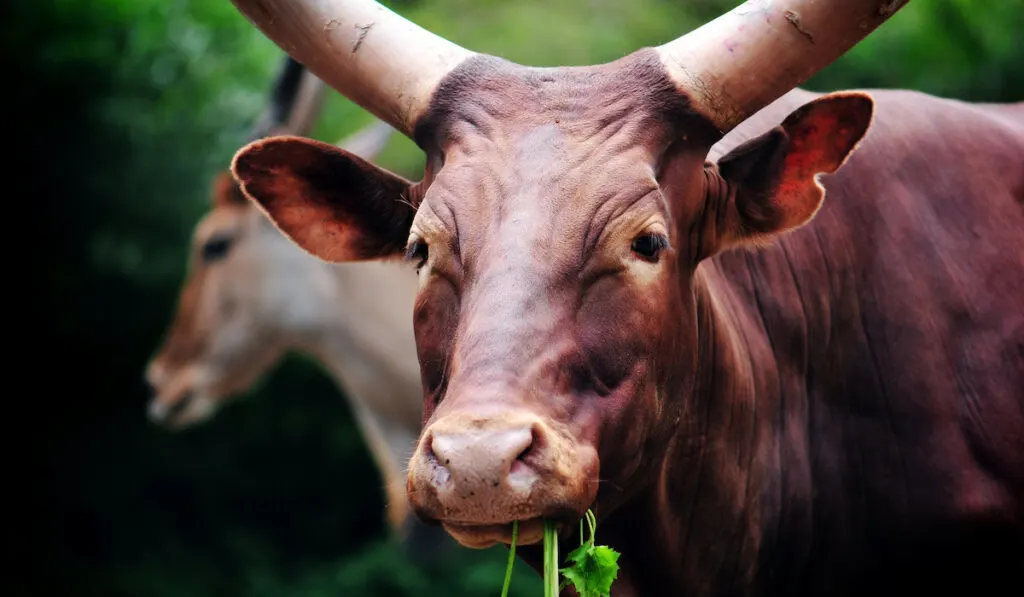
Table of Contents
Can Cows Eat Celery?
The answer is yes, cows can eat celery. Studies have shown that cows can digest celery without any problems.
However, hold your horses (or cows), because there are some things you need to keep in mind.
Should Cows Eat Celery?
Celery is a veggie made up of about 95% water.
It’s a good thing because a portion of fresh celery helps you keep your animals hydrated.
Studies have shown that cattle that eat moderate amounts of celery may not feel thirsty for extended periods.
For that reason, if you live in arid areas, it’s beneficial to add celery to your cows’ diet.
On the other hand, you shouldn’t give them too much of it. Cows require a balanced diet that includes a variety of forages and hay, as well as a source of protein such as soybeans or corn.
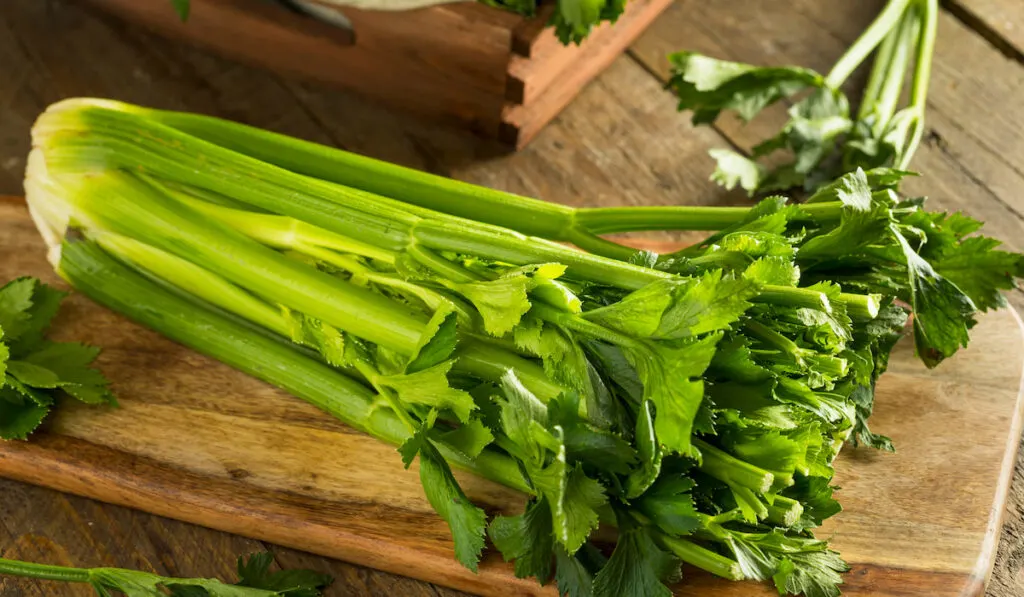
Is Celery Good for Cows?
Even though it’s healthy and generally good for cows, celery is not the food that can meet a cow’s daily energy requirements.
Cows are animals that need a lot of energy to maintain their body condition and produce milk. That’s why high-energy feeds should make up the majority of their diet.
In most cases, energy feeds adjusted to cattle consist of high-starch grains such as barley, corn, wheat, and sorghum, together with fibrous byproducts like beet pulp, soybean hulls, and wheat middlings.
It’s also good to add fat sources – animal and vegetable oils as well as oilseeds.
Also, it is very important to consider the stage of growth or lactation of your cow.
Cows that are in the early stages of lactation need more high-energy feed than dry cows, which means you need to adjust it to meet their needs.
Here’s another factor you should pay attention to when adjusting diet properly – growing heifers have different nutrient requirements than mature cows.
You can give cows celery as a tasty treat and a supplement to their regular diet, but it should not make up a large percentage of their daily intake.
Also, large amounts of celery could cause some tummy troubles with your cow.
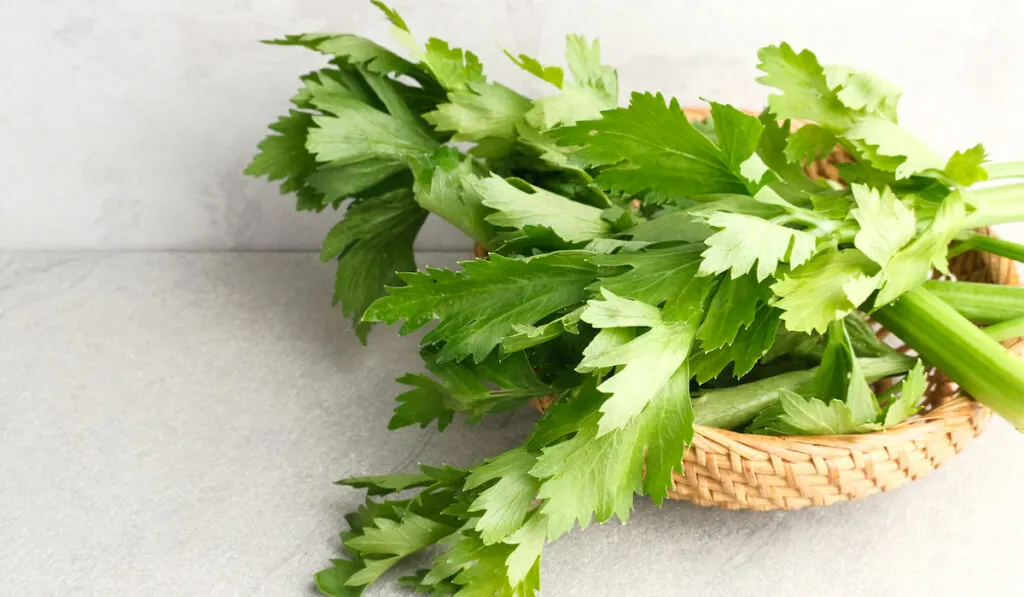
Is Celery a Healthy Treat for Cows to Eat?
Celery is a safe and healthy treat for cows to consume.
First of all, it’s a vegetable that’s full of both soluble and insoluble fiber. This means that it can speed up digestion and help cows in general.
It’s also a great source of fancy-sounding pectin-based polysaccharides. They improve the stomach lining and by that, your cow has less chance to get health issues such as ulcers.
We still don’t fully understand what exactly causes ulcers, but certain factors could contribute to it, such as:
- not eating enough for a long time
- stress
- imbalanced diets with either too much or too little dietary fiber
So, celery is one of the healthy treats that help you avoid such issues. It’s also packed with vitamins A, C, and K, as well as minerals such as potassium and folate.
As you may know from your diet, vitamin C is one of the essential nutrients for building antibodies. Those are special proteins that boost the body and help it fight against different diseases.
That’s why animals that consume it regularly will remain healthier even through harder and more challenging times.
Celery contains a nutrient called vitamin K, which helps reduce the risk of blood clots and makes bones stronger.
If a cow has problems with any of these things, consider adding celery to its menu.
Celery has properties that can help reduce inflammation in cattle.
Celery can help cows heal wounds faster and decrease the chances of inflammation happening. It can also protect them from conditions like arthritis, which causes swelling and stiffness in their joints.
Celery contains a mineral called potassium, which is helpful for cows in several ways. One important benefit is that it can participate in lowering blood pressure in cattle.
It also plays a role in reducing the risk of certain health issues such as kidney stones and arthritis.
These nutrients can be beneficial for cows, especially when they are included as part of a balanced diet.
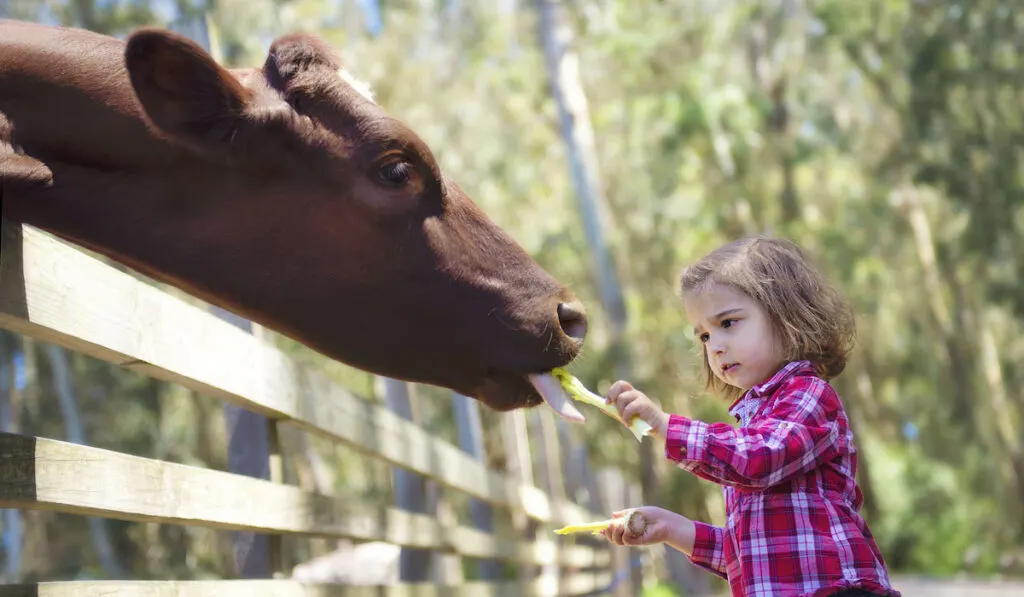
Tips for Feeding Celery to Cows – What You Should Know
Cows can eat celery without facing any serious issues, but there are still things you need to pay attention to.
For example, the celery you give to your cows must be fresh and free of pesticides or other chemicals.
Cows, like all animals, can be sensitive to these substances, and consuming contaminated celery can lead to health problems. Therefore, washing the celery thoroughly before serving it to the animal is always better.
Keep it as organic as possible – for both you and the animals you feed.
Also, you might not want to feed the cow celery leaves unless you cut them into smaller pieces. The animal isn’t used to eating celery like that so it could cause them to choke.
All in all, celery is a pretty good supplement your cow will certainly appreciate.
Still, when you’re making changes to a cow’s diet and are not completely sure about them, it’s best to talk with a veterinarian or a nutritionist.
These experts will ensure your cows are getting adequate amounts of the right nutrients to maintain optimal health.
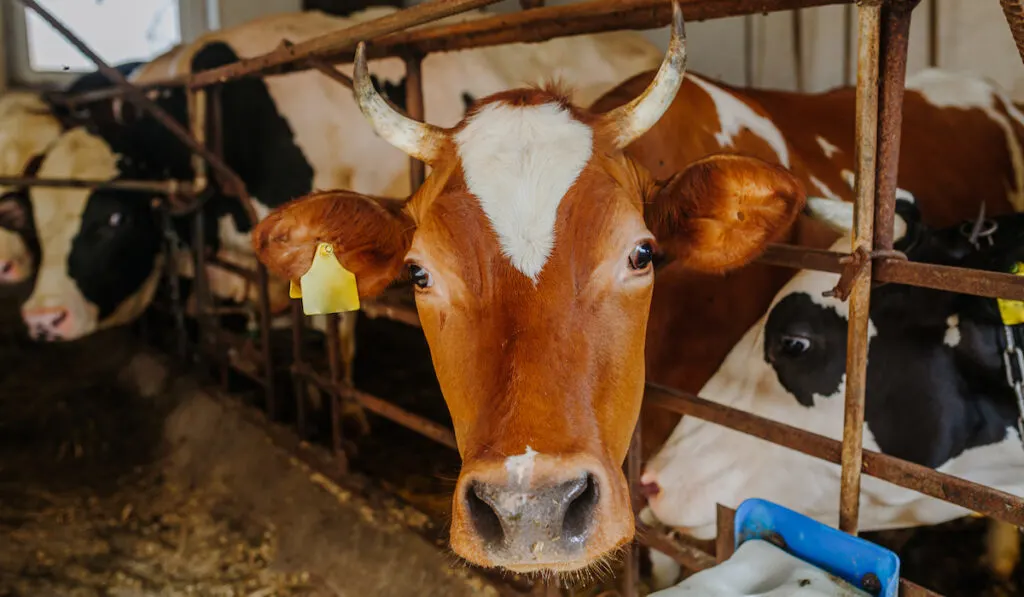
Some Final Words
Celery is a type of vegetable that is often used in salads and as a garnish for many different dishes. Why not treat your cows with it from time to time?
When feeding celery to cows, it is important to keep in mind that it should not be the only food they are given.
It’s not a feed substitute since it can’t provide the cow with all the nutrients and minerals it needs to remain healthy and function normally.
Celery is better off as a light, refreshing snack your cows can enjoy. However, just like with any food, it’s a supplement they need to eat in moderation.
It can’t replace their basic menu because it doesn’t meet their daily energy requirements. Also, celery doesn’t contain all the nutrients and minerals they need to stay healthy.
Make sure that celery is free of pesticides and fresh as well as cut into smaller pieces.
Celery can provide important nutrients that cows need to stay healthy and help them digest their food properly.
Just like eating vegetables is good for us humans, giving cows celery in the right amount as part of their balanced diet can be good for them too!
Resources:
- https://pharmeasy.in/blog/8-health-benefits-of-eating-celery/
- https://extension.oregonstate.edu/animals-livestock/beef/importance-energy-nutrition-cattle
- https://agricsite.com/can-cows-eat-celery/
- https://whatanimalseat.com/can-cows-eat-celery/
- http://www.veterinaryhandbook.com.au/Diseases.aspx?diseasenameid=10
